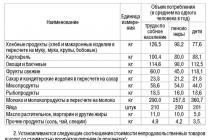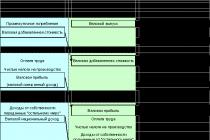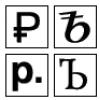As a result of tighter regulation banking service More than half a million businessmen lost access to their accounts
Since the beginning of the year, banks have blocked over 500,000 business accounts as part of the fight against cashers. Kazan businessmen also faced similar cases: the threat of blocking a bank account may hang in connection with seemingly completely innocent operations. Realnoe Vremya's experts believe that the reasons for such "tightening the screws" lie in the state's simple desire to collect more taxes, which is why the fight against cashers is expanding.
Half a million blocked accounts
Since the beginning of the year, banks have blocked more than 500 thousand accounts of entrepreneurs as part of the fight against cashiers - such data leads social organization Business Russia. The blocking is connected precisely with combating money laundering within the framework of 115-FZ, the head of the Center for Financial and Credit Support told Realnoe Vremya " Business Russia» Alexey Poroshin. In particular, we are talking on the fight against one-day firms and schemes for illegal cashing out of funds.
I agree that if the company really conducts an illegal type of activity, its accounts must be closed, Poroshin comments. - But often honest entrepreneurs who conduct their business within the framework of the law also fall under the “one brush”, but suddenly some of the operations they perform seemed dubious to the bank<…>. Even if you paid 100 rubles to a clear, high-quality supplier, and he then transferred this money to a counterparty dubious for the Central Bank, your company may also fall under the law.
According to Nagumanov, the Ombudsman is rarely asked for support - much more often blockages occur due to non-payment of taxes. Photo by Maxim Platonov
Timur Nagumanov, Business Ombudsman of the Republic of Tatarstan, also confirmed the trend towards an increase in the number of blocking of accounts in connection with combating money laundering to Realnoe Vremya. However, according to him, the Ombudsman is rarely asked for support - much more often blockages occur due to non-payment of taxes.
We know that this trend exists,” Nagumanov commented on the situation. - But such applications are few. Still, entrepreneurs deal with banks, there is no excitement about this. More often we work out issues with blocking at the request of the tax authorities.
Among other cases, entrepreneurs pointed out that the bank blocks the account on demand for alleged debts to the Pension Fund.
However, not all experts note a similar problem. Thus, Pavel Tubaltsev, head of the legal department of the law firm Tatyurinform, believes that mainly those who should be blocked, that is, participants in cash-out schemes, fall under blocking.

The Central Bank regularly publishes guidelines banks associated with this law. Photo sotnibankov.ru
Working less than two years - already half suspicious?
Note that FZ-115 itself has not changed for quite a long time, but the Central Bank regularly publishes guidelines for banks related to this law. Thus, the recommendations of July 21, 2017 provide a number of signs of companies over which banks should establish enhanced control:
- cash accounts for more than 30% of the weekly turnover;
- less than two years have passed since the date of establishment of the legal entity;
- the activity within the framework of which operations are carried out to credit and debit funds from the account does not create obligations for its owner to pay taxes or the tax burden is minimal;
- money is credited to the account from counterparties, on whose bank accounts operations are carried out with signs of transit;
- money is credited to the account from the counterparty, who simultaneously transfers funds to the accounts of other clients;
- funds, as a rule, are credited to the account in amounts not exceeding 600 thousand rubles;
- cash withdrawals are carried out regularly, daily or within three to five days from the date of receipt;
- cash withdrawal in an amount not exceeding 600 thousand rubles, or in an amount close to the maximum amount of funds that can be issued to a client within one business day;
- money is withdrawn at the end of one business day and again - at the beginning of the next;
- the client has several corporate cards, through which cash is withdrawn, and there are almost no other operations.
Thus, any newly opened company can fall into the field of view of financial monitoring, especially if its activities are associated with a large amount of cash, for example, from the sphere of trade or household services. However, not everyone sees such recommendations as a threat to business.
This is just a sign, it will not attract everyone to be recognized as unreliable, - Tubaltsev believes. - I don't see a problem.

According to Rustem Akhmetsafin, a call from the bank's financial monitoring service may come after one large payment not in the field of activity. Photo by Maxim Platonov
Target spending only
In this list Special attention should be drawn to the third paragraph, which says that the bank may be suspicious of payments that are not related to the activities that are prescribed in OKVED codes. According to Rustem Akhmetsafin, the head of the legal company Business Advisor, a call from the bank's financial monitoring service may come after one large payment outside the field of activity.
I had a situation, they bought a car for a company,” he said. - Everything, non-standard operation. There was a call from the financial monitoring service, they asked what kind of non-standard operation it was, why you were conducting such a non-standard amount. You usually provide legal services, and then suddenly some kind of suspicious sale.
In addition, suspicions may arise due to the large volume or frequency of transfers - what if this company is a “transit” company in some kind of “gray” scheme? “For example, a company is engaged in the sale of metal structures, it has several million in its accounts a day,” Ahmetsafin adds. “The bank already sees this as a possible cash-out scheme, and they are starting to block the accounts of everyone in a row.”
For example, you are engaged in construction, but you decided to hold a sports tournament for your employees and paid for the rent of a football field to some individual entrepreneur in Sochi, Poroshin gives other examples of “suspicious” operations. - Here the purpose of the payment does not correspond to the nature of your business. Or if your income is equal to expenses, or you transferred money to counterparties too quickly - this may seem like a “transit” to the bank. The check goes almost to the tenth knee.

Blocking is sudden
Specialists Tinkoff Bank are even more radical: “If you are an entrepreneur, any bank can suddenly block access to your account. The reason is the suspicion of cashing out. To reduce the risk of blocking, they also recommend checking counterparties, describing all transfers in detail, and responding to requests from the bank's financial monitoring service in a timely manner. But, as Ahmetsafin notes, an account can be blocked absolutely suddenly, without any warning from financial monitoring, and from other services of the bank.
If you understand, then this (blocking an account without warning, - approx. ed.) is unacceptable, he says. - But although the bank is located [with the entrepreneur] in contractual relations, he still occupies a position of strength. Well, how can we put pressure on him? Will we not pay a thousand rubles for account maintenance? You can, of course, hype this issue, complain. But it will take a lot of time and money. And people need to work.
“The state is becoming more and more “toothy” and strong”
Experts agree that now there is a strengthening of regulation in the sphere of relations between the bank and entrepreneurs. “New laws, the strengthening of the state is taking place,” Tubaltsev comments. - Of course, our state is becoming more and more “toothy” and strong. It's probably okay. We are progressing. The state has new tools in the fight against those people who do not comply with the law.”
This is all connected with the desire of the state to collect more taxes, Ahmetsafin believes. - To do this, it begins to fight with cashiers. It knows that cashers are often small banks, in connection with this there was a surge in the closure of banks, the revocation of licenses. Small banks are being removed, leaving only banks obedient to the state, which are becoming even more obedient.
Poroshin also agrees that the serious attitude of banks is associated with the risk of losing a license. Because of this, in his opinion, "banks have become control and supervisory bodies."
Alexander Artemiev
Central Bank expands targeted fight against money laundering and illegal cashing Money. The largest banks, in which dubious clients have a high chance of going unnoticed, are recommended to close accounts whose owners arouse the Central Bank's suspicions. This is what the Bank of Russia did before, but on an incomparably smaller scale. The reason for the activation of the regulator is the constant improvement of washing and cashing schemes.Information that the largest banks are undergoing mass closing of accounts of suspicious clients "on a tip" from the Central Bank appeared on the banking forum MBKcentre.pro. The activation began about two months ago, Kommersant's sources confirm. "All measures are in line with the letter of the Central Bank 236-T" On increasing the attention of credit institutions to separate operations clients”, issued at the end of last year, one of the bankers notes. “It’s just that now they are doing targeted work with the largest banks: they call, they show how to put into practice the recommendations set out in the letter.” It has reached the lists of specific clients sent by the Central Bank to specific banks, on which the latter are recommended to pay close attention, bankers say. "The lists are not sent out for the first time, this work has been carried out with banks for a year, but now it has gained such a scale that it has become visible to the naked eye," one of Kommersant's interlocutors notes. Thus, there are, in fact, two news: the activation of targeted work with the clientele major players and the emphasis is on closing already open accounts, and not on the denial of acceptance for service, as before.
The press service of the Central Bank confirmed the fact that lists of suspicious clients were sent to banks. "According to the law" central bank"The Central Bank has the right to request from the bank additional information about customers who, on the basis of information resources The Central Bank raises suspicions in terms of transactions with a confusing or unusual nature, indicating the absence of an obvious economic sense or legitimate purpose, "they note. The volume of such a request is individual, and in each situation depends on the number, nature, frequency of such operations performed by customers, they add in the press service of the Bank of Russia.Lists, of course, are not disclosed.
Having received such a request, banks conduct an in-depth check of the activities of clients: obtaining information about the purposes of establishing and the intended nature of their business relations with the bank, about the goals of activities, financial position, business reputation of the client, about the sources of origin of his funds, etc.
Then they send information to the Central Bank about the measures taken. At the same time, the Central Bank does not have the right to oblige banks to part with customers - banks make such decisions on their own, the press service of the Central Bank emphasizes. The number of bank customers included in these lists was not specified by the Central Bank, explaining that Rosfinmonitoring has statistical data. Rosfinmonitoring did not disclose them. "Statistics depend on many factors: seasonal fluctuations in the economy, increased intensity of the Central Bank's supervisory activity, regional peculiarities," said Pavel Livadny, Deputy Director of Rosfinmonitoring.
Comment on a topic in detail big banks did not. Sberbank and Alfa-Bank spend all provided by law measures, including exercising the right to refuse to conduct transactions or open an account. “We have always paid due attention to compliance issues, now, due to the increased regulation of the Central Bank in this area, we, like the entire market, are acting accordingly,” Alfa-Bank added. In press services VTB Group and Otkritie declined to comment. The RSHB did not respond to Kommersant's request.
I already wrote that the list of suspicious clients sent to banks contains not only companies that can probably be suspected of laundering or illegal cashing out of funds, but also non-profit organizations, both those who have received the status of foreign agents, and those who have been noticed in disloyalty, but have not yet received the stigma. There are also individuals. The list of individuals almost entirely consists of the names of people involved in opposition activities to one degree or another. I am known by at least two such cases: banks did not close their accounts themselves, but recommended to customers to do it themselves or created for such customers special conditions, in which clients obviously could not work. I am just doing a little investigation on this matter, by the New Year I will be able to publish this information. If anyone else has had this issue, please let me know.
The Bank of Russia is expanding its targeted fight against money laundering and illegal cashing. In the largest banks, there are mass closures of accounts of suspicious customers, which raise doubts with the regulator, Kommersant writes.
According to the publication, the activation began about two months ago due to the constant improvement of money laundering and cashing out schemes. “All measures are in line with the letter of the Central Bank 236-T “On increasing the attention of credit institutions to individual transactions of clients”, issued at the end of last year, one of the bankers confirmed to the publication. “It’s just that now they are doing targeted work with the largest banks: they call, they show how to put into practice the recommendations set out in the letter.”
It has reached the lists of specific clients sent by the Central Bank to specific banks, on which the latter are recommended to pay close attention, bankers say. “The lists are not sent out for the first time, this work has been carried out with banks for a year, but now it has gained such a scale that it has become visible to the naked eye,” one of the interlocutors of the publication notes. Thus, there are, in fact, two news: the intensification of targeted work with the clientele of large players and the emphasis on closing already opened accounts, and not on refusing to accept services, as before.
The press service of the Central Bank confirmed the fact that lists of suspicious clients were sent to banks. “According to the law“ On the Central Bank ”, the Central Bank has the right to request from the bank additional information about customers who, based on the information resources of the Central Bank, raise suspicions regarding transactions with a complicated or unusual nature, indicating the absence of an obvious economic sense or legitimate purpose,” they note there. . The volume of such a request is individual and in each situation depends on the number, nature, frequency of such operations performed by clients, the press service of the Bank of Russia adds. Lists, of course, are not disclosed.
Having received such a request, banks carry out an in-depth check of the activities of clients: obtaining information about the purposes of establishing and the intended nature of their business relations with the bank, about the goals of the activity, financial position, business reputation of the client, about the sources of origin of his funds, etc. Then they send Central Bank information on the measures taken. At the same time, the Central Bank does not have the right to oblige banks to part with customers - banks make such decisions on their own, the press service of the Central Bank emphasizes.
Large banks did not comment on the topic in detail. In and Alfa-Bank, they carry out all the measures provided for by law, including the exercise of the right to refuse to conduct operations or open an account. “We have always paid due attention to compliance issues, now, due to the increased regulation of the Central Bank in this area, we, like the entire market, are acting accordingly,” Alfa-Bank added. The press services of VTB Group and Otkritie declined to comment. Rosselkhozbank did not respond to the newspaper's request.
In an informal conversation, bankers confirm that the vast majority of companies from the lists do have reasons to refuse service, but there are exceptions, including those who have corrected themselves. However, given the determination of the Central Bank, it is easier to get rid of them.
Since the beginning of 2015, there has been a “massive” suspension of operations on accounts legal entities commercial institutions. The owners have to prove for a long time that the company does not fall under the signs of a “transit” one, and the income is far from being obtained by criminal means. What the CFO should know when “blocking” an account and how to prevent the suspension of the company’s activities, we will consider in this article.
How not to get under mandatory control
Relations between citizens of the Russian Federation, foreign citizens and stateless persons, organizations carrying out transactions with cash or other property, as well as government agencies, exercising control on the territory of the Russian Federation over operations with cash or other property, in order to prevent, detect and suppress acts related to the legalization (laundering) of proceeds from crime and the financing of terrorism, the law No. (laundering) proceeds from crime and the financing of terrorism” (hereinafter referred to as the Law). Transactions that are clearly specified in clause 6 of Law No. 115-FZ are subject to mandatory control. Based on this law, banks have the right to block an account (art. 3 - terrorist or extremist activity) or suspend account transactions (Article 11, Article 7). It should be noted that Rosfinmonitoring maintains such lists and sends them to banks.
So that your company does not fall under the mandatory control of the Bank and Rosfinmonitoring, you must take care of buying a legal address in advance, as well as adhere to the following recommendations, according to the most relevant criteria of clause 6 of the Law:
A transaction with cash or other property, if the amount for which it is performed should not exceed 600 000 rubles(or is equal to or exceeds the amount in foreign currency equivalent to 600,000 rubles) OR all supporting documents must be submitted to the Bank for this transaction, incl. operations such as:
- withdrawal from the account or crediting to the account of a legal entity of funds in cash in cases where this is not due to the nature of his economic activity(For example, the Charter of the organization specifies the type of activity - wholesale trade in food products, and the check is provided to the bank for cash withdrawal for the purpose of purchasing equipment for drilling wells, etc.)
- buying or selling cash foreign exchange individual
- purchase by an individual of securities for cash
- receipt by an individual of funds under a bearer's check issued by a non-resident
- exchanging banknotes of one denomination for banknotes of another denomination
- contribution by an individual to the authorized (share) capital of an organization of cash in cash
- transactions for crediting or transferring funds to an account, granting or receiving a credit (loan), transactions with securities in the event that at least one of the parties is an individual or legal entity having, respectively, registration, place of residence or location in a state (territory) that (which) does not participate in international cooperation in the field of combating the legalization (laundering) of income received by criminal means
- provision by legal entities that are not credit institutions of interest-free loans individuals and (or) other legal entities, as well as not receiving them.
According to the Law, all loans without indication of value % in the purpose of payment or in the amount of more than 600 tr. come under mandatory control. If in payment order of the client in the purpose of payment, the % rate at which the loan is provided is indicated, then such a payment does not fall under control. The term of the loan and its economic essence do not matter, only the rate. Indicated in the appointment% - and there are no questions to the company. It is worth noting that if the client regularly (key feature) "practices" with such operations, even with % loans, the bank will become interested in him on the grounds of additional control and even then he may ask to close the account (blocking is used very rarely).
All of the above criteria, as well as others specified in paragraph 6 of the Law, are artificial filters - a signal to the regulator. No need to look for logic in them. But at the same time, it is worth remembering that in the presence of the constant occurrence of such factors, and even without providing documents, Rosfinmonitoring may be interested in your company first of all (they will come out with a check), and then they may involve the prosecutor's office, the Economic Crime Department and other relevant bodies.
How not to get under additional control
In addition to the mandatory control by the Bank, there is additional control, which is carried out by the bank on the grounds of paragraph 3 of Art. Law No. 115-FZ is the identification of dubious client transactions. This is the same subjective control on the part of the bank according to the principle of "imagining - not imagining". It is also controlled by Rosfinmonitoring and the Central Bank of the Russian Federation.
…
As recommendations, for additional control, the Central Bank of the Russian Federation issued Letter No. 236-T dated December 31, 2014 “On Increasing the Attention of Credit Institutions to Certain Client Operations” and introduced signs of transit companies. Consider them with comments and recommendations:
|
sign |
Comments |
|
|
Crediting funds to the client's account from a large number of other residents from accounts opened with banks of the Russian Federation, with their subsequent write-off |
For each company, the concept a large number of residents” individually, it all depends on its scale and type of activity. For example, if a company is engaged in construction and installation works, its account receives daily revenue from 20-30 companies, there are only a few objects, there are “framework” agreements - for the bank this will be suspicious transactions. Or the company's account receives receipts from a large number counterparties, from all insignificant amounts, which is not typical for the type of activity of the company, etc. |
Have a justification in the form of frequency and number of receipts, corresponding to the type and scale of the company's activities: Contracts must be with clear terms of payment and schedules for the performance of work (services), amounts, terms, penalties (at least with specifications attached) |
|
Funds are debited from the account within a period not exceeding two days from the day they are credited. |
Unfortunately, this point is more complicated. Most companies conduct settlements on the same day, and rarely does anyone keep money for 2 days in a current account. Almost every company falls under this category. In addition, it is not clear how the bank will be able to sort through which receipts the payment was made. This criterion will be taken into account by banks, taking into account the above in aggregate. |
- The bank will not be able to prove from which receipts the payment was made, for example, on 01.01 5 m.r. came, on 02.01 10 m.r. numbers? - this is the subject of the dispute with the bank. |
|
Write-offs of funds from the account are made regularly (usually daily) or are carried out over a long period of time (usually at least three months) |
In this case, such a picture can be observed in trading companies and with a high probability the bank will not apply this clause to it. But if the regularity of receipt and write-off of funds will be at the production or construction company, and not yet large sums, then the chance of getting an account blocking is great. Again, in the aggregate of the above factors and after a full audit of the company. The bank may request agreements with counterparties and analyze the form and terms of payment, compare this fact with the type of activity. |
- The nature of the activity should correspond to the receipts (purpose of payment or frequency of receipts) - The balance sheet currency should be comparable to the revenue, except for seasonality factors and the specifics of PBU maintenance. For example, the number of customers (more than 80) is not comparable to the volume of the company's activities, with annual revenues of more than 500 million rubles. per year and the presence of only 5 contractors. |
|
The activity of the client, within the framework of which funds are credited to the account and funds are debited from the account, does not create obligations for its owner to pay taxes, or the tax burden is minimal. From used to specified operations accounts payment of taxes or other obligatory payments in budget system Russian Federation not carried out or carried out in insignificant amounts, not comparable with the scale of the activity of the account holder |
In this case, the Bank will compare the tax burden with the scale of the company's activities, request documents confirming the payment of taxes for the last tax (reporting) period, or documents confirming the absence of grounds for paying taxes. As a rule, the bank asks the company to provide an explanation for the absence or insignificant volume, incomparable with the scale of the organization's activities, tax payments, salary payments to employees of your company; rent payments with the provision of copies of payment documents confirming the above payments for the past reporting period, certified by the stamp of the bank through which these payments were made. Large turnover on accounts and very insignificant tax payments, wage, rent, electricity, electricity, lack of general business payments (office cleaning, office water, stationery, etc.) - all these are signs of an organization's non-real activity. |
As a recommendation, you can start from the minimum tax burden and profitability established by the Federal Tax Service; the burden should not be less than the indicators indicated on the website of the Federal Tax Service http://www.nalog.ru/rn77/taxation/ tax returns for income tax and value added tax must be sent to the Federal Tax Service in accordance with applicable law |
|
In addition to the documents indicated in the table, the Bank may request the following information: |
||
Transit operations can be characterized by a combination (simultaneous presence) of the signs indicated in the table. The key issue in all customer transactions is their economic expediency . According to the Bank of Russia, the activities of such clients have no obvious economic sense and obvious legitimate purpose, and the relevant operations require increased attention from credit institutions as part of financial monitoring for the legalization (laundering) of proceeds from crime, the financing of terrorism and other illegal purposes.
According to the signs of "transit", the bank independently develops an action plan for working with the client - request documents in electronic or paper form, go to the place of business or not, conduct an additional security check, etc. In order for the bank to recognize the client as a “transit” office and suspend operations on the account, and subsequently ask to close the account, there must be a TOTAL of the signs referred to in the article. works with a client (will ask to close the account).
If credit institutions identify the above operations in the activities of companies, the Bank will request documents on the basis of which it will be able to draw a conclusion about the presence of "transit" operations in the activities of the company. If the company fails to provide the documents requested by the bank after one month after the end of the tax (reporting) period in which such documents (information) were requested, the credit institution has the right to refuse to execute the client's order to complete the transaction , with the exception of transactions for crediting funds. If the client did not provide the documents or they did not suit the bank, the bank will offer to close the client's current account. When closing an account, the client indicates to which other account to send funds. It should be noted that the bank is not obliged, but has the right to refuse to execute the client's order. That is, the Bank may or may not exercise this right. It is always easier for the bank to reach an amicable agreement with the client in order to avoid problems such as lawsuits for “lost” profit due to the suspension of operations on the account. As a rule, if the client is assertive and the bank feels that the company can be recognized by the court as “not transit”, the bank offers the client to close the account on his own, and continues operations not for this period.
When to close an account
In accordance with Article 5.2. of the Law, if there are signs of "transit" and suspicious transactions, credit organizations has the right to terminate the bank account (deposit) agreement with the client in case of acceptance within calendar year two or more decisions to refuse to execute the client's order to perform a transaction on the basis of clause 11 this article. In addition, in accordance with Art. 11. Organizations that carry out transactions with cash or other property have the right to refuse to execute a client's order to complete a transaction, with the exception of transactions for crediting funds received to the account of an individual or legal entity, for which the documents necessary to record information in in accordance with the provisions of this federal law, and also if as a result of the implementation of the rules internal control in order to counter the legalization (laundering) of proceeds from crime and the financing of terrorism, the employees of an organization carrying out transactions with money or other property suspect that the operation is being carried out for the purpose of legalization (laundering) of proceeds from crime or the financing of terrorism .
If your company received a request from the Bank on the grounds specified in this article and your documents are not satisfied with the Bank's arguments, in this case, close the account without waiting for repeated requests. If the Bank is customer-oriented, it will quickly respond to the documents you provide (within 3 days). If the Bank decides to use your funds for free, the verification may take weeks. That is why, without waiting for repeated requests, close the account.
Attention- when suspending operations on the account, you cannot give an order to “return” funds to the sender. Or bring documents to the Bank or close the account.
To close an account, the company writes an application to the bank to close the account. There is a column in the application for closing - transfer the balance of money on the account being closed to such and such an account in such and such. And if in unilaterally the bank closes the account, the bank will ask the company for a letter to which account to transfer the money. No certificates from the Federal Tax Service and other state bodies are required.
In general, offices with a small turnover (less than 10 million rubles per month) are rarely of interest to anyone.
What actions should a company take to avoid blocking accounts
In order not to fall under the signs of "transit" companies or "untrustworthy" companies carrying out questionable transactions, you must adhere to the following recommendations:
- All payments must be made to one account. It often happens that the office has 2-3 accounts (in different banks) and taxes are paid on one account, settlements with counterparties are made on another, and salaries are paid on the third. And endless replenishment of accounts (transferring money from one bank to another). Chief accountants love to work this way. Usually that's where all the problems come from. They are so much more comfortable. They divided the accounts - and each accountant was given to serve them. One RFP pays, the other pays taxes, etc. As a result, “two buckets of requests” from banks.
- Do not register with a bulk registration address
- Do not appoint persons under 22 or over 60 years of age as directors of the company
- The founder must not be a founder in another 2-10 company
- Clearly state the essence of the transaction in the purpose of payment - prepayment under contract No. __ from ___ for goods, etc., which corresponds to the type of company's activity
- Maintain document flow in one place, so that in case of verification it would not turn out that the accountant (outsourced) left somewhere, and the documents are in her office
- Make any payments at least on the basis of signed documents in a scan
- The actual location must correspond to that specified in the Charter
- The presence of a "live" landline phone - on which someone answers.
- Leaders need to be connected
- Tax payment must be at least the industry average
- There must be a payment of salary of at least 10 tr. with deduction of taxes (according to the current account) in accordance with the submitted to the bank staffing
- The staff should also have employees in addition to CEO if the company is not a small business (annual revenue of more than 400 tr.)
- The company does not have its own or leased production, office, retail, warehouse space necessary for doing business
Since 2017, banks have been massively blocking settlement accounts of owners of small and medium-sized businesses. At least 500,000 entrepreneurs faced this problem last year.
The blocking of a bank account has the only reason - the law 115-FZ "On counteracting the legalization (laundering) of proceeds from crime and the financing of terrorism."
As a rule, the bank simply refers to the law and does not indicate what exactly seemed suspicious to it. Access to money is closed very quickly, but it is not so easy to remove sanctions from the current account, you need to go through long litigation and prove that the entrepreneur had no intent to finance terrorists or money laundering.
In an interview with the site, the deputy chairman of the non-profit association Ural Banking Union told what transactions a client can blacklist and how to get out of there.
Since last year, a wave of blocking the accounts of entrepreneurs has been rolling in, banks refer to 115 Federal Laws and do not give specific explanations. Why is this happening?
Let's figure it out first. Many people can block an account. Tax if the company does not pay taxes. If you don't pay child support, your account will also be blocked. The court can also block the account as part of some interim measures.
I'm not talking about blocking accounts, I'm talking about closing accounts and suspending operations within the framework of Federal Law 115 "On counteracting the legalization (laundering) of proceeds from crime and the financing of terrorism."
Entrepreneurs most often complain about the closure of accounts without explanation from the bank. Because if the tax blocked the account, then it is clear what is the reason. But as for 115 FZ, from the point of view of an entrepreneur, he seems to be acting within the framework of the law. Entrepreneurs often say “everyone does it, but they suddenly blocked me.” But the main thing in this law is not the closure of an account, but the fact that the bank reports to the Central Bank and information on illegal operations. Then Rosfinmonitoring transfers the data to law enforcement agencies, and there it is clear how the matter ends.
The problem is that last year a law was adopted, according to which it is possible to close the accounts of legal entities, moreover, banks have been empowered not to open accounts. For example, in the USSR, a bank was not required to open an account for a client. The whole banking revolution in the 90s came down to the fact that the bank never has the right to refuse a client to open an account, that is, the client is always right.
And in 2017, they did the same as in the USSR: if a bank does not want to open an account for a client, then it can not do it, and no explanation of the reason is needed.
And then a list of Rosfinmonitoring and the Central Bank appeared, in which all account closures were recorded. The Bank of Russia and Rosfinmonitoring said that the inclusion of entrepreneurs or organizations in this list is not a reason for a mandatory refusal to open an account. However, the banks took the list as a guideline and simply stopped opening it to those individuals who were on this list.
As a result, if you are on the list, do you not open an account?
The Central Bank said that the list is needed only for, and being on the list does not mean that opening an account will be refused. However, in fact, few banks want to open a current account for a client from this list.
But in March of this year, amendments entered into force that allow customers to rehabilitate themselves. Now the client has the right to submit documents to the bank that confirm that there are no grounds for closing the account. The bank is obliged to consider the application within 10 business days. Having received a message about the impossibility of rehabilitation, the client has the right to apply with an application and supporting documents to a special interdepartmental commission at the Bank of Russia. The total term for their consideration by the commission is no more than 20 working days from the date of the applicant's application.
Why can you get on the list of the Central Bank under 115 FZ?
115 FZ tells us about two cases: financing of terrorism and money laundering. Very often, entrepreneurs do not see that they are committing an illegal act, they may not even have intent.
Under the financing of terrorism may be a completely non-obvious thing. For example, you transferred money to a migrant janitor who was hired, but for some reason did not formalize it. And this person was on the list of Rosfinmonitoring.
No one will understand why you transferred money to a person who is included in the list of terrorists. On the Rosfinmonitoring website there is a public list of persons financial operations with which will be regarded as financing of terrorism.
If you are interested in a servicing bank or the Bank of Russia, then, as a rule, you will receive a letter in which the relevant institution will ask you for supporting documents. Some entrepreneurs take these letters with hostility and say: “Who are you, I won’t show you anything.”
Secondly, the Central Bank directs banks to check the reality of the business. The reality of business is, first of all, the reality of transactions. And now there is an entrepreneur with a small but stable business. This business does not bring super profits, it stalls a little, but it has been working for a long time. From a bank's point of view, good client. Suddenly, a snake tempter appears, who says that he has an acquaintance who has conceived a great project. The authors of this project are ready to transfer money to his account, he will withdraw it and return it, and he will receive a percentage of this.
As a result, a normal entrepreneur who has real business, but which experiences in this moment difficulties, becomes a cashier.
10 million rubles are transferred to his account, he comes to the bank to withdraw this amount. The bank blocks the money, and transfers the information to Rosfinmonitoring and the Central Bank. The entrepreneur, of course, does not agree with the decision of the bank. He screams that he was an honest entrepreneur for 20 years, and then he was suspended from servicing his account.
We see that if earlier shell firms were engaged in cashing out, today honest entrepreneurs with a long history and an operating company are brought under the article.
But what if the company was mistakenly included in the Rosfinmonitoring list and the account was closed?
Usually, in situations with the suspension of account maintenance, it is very clear which of the entrepreneurs earned money in an honest way, and which really fits under 115 FZ.
An honest entrepreneur will definitely go to court, because he does not intend to give his money to anyone. If your money was frozen because someone in the bank just wanted to, then the court will oblige you to return all the money with a commission.
If the entrepreneur suspects that he may have problems under 115 Federal Laws, then he will not go to any court. He can shout about injustice in social networks, in the media, but he will not even write to the interdepartmental commission. Because he perfectly understands that there will be checks and it will be even worse.














